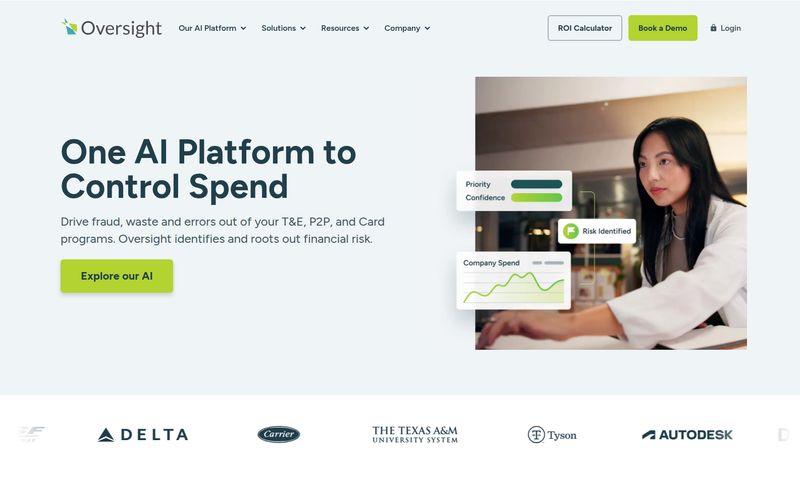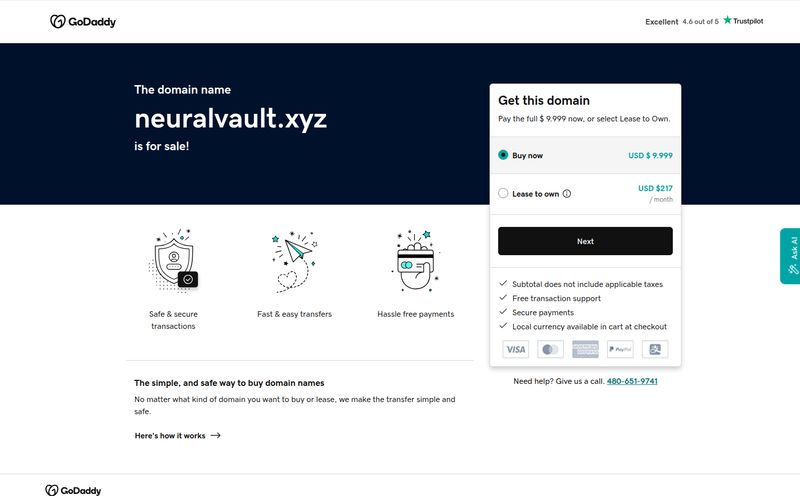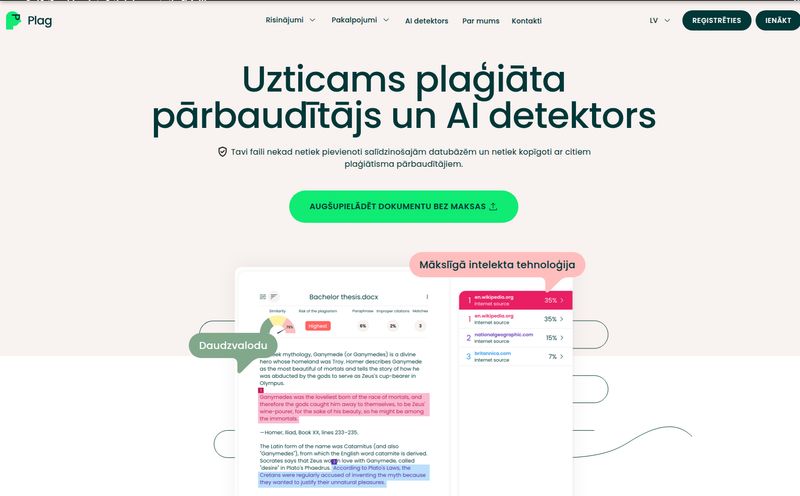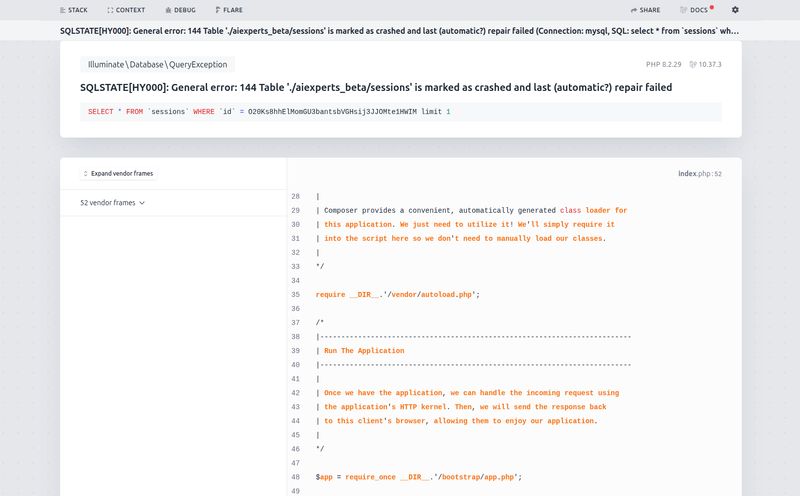The last couple of years in the SEO and content world have felt like a high-speed chase. First, AI writing tools like ChatGPT exploded onto the scene, and we all collectively went, “Whoa.” Then, almost immediately, a whole new industry of AI detection tools popped up, trying to catch the AI red-handed. It's a classic cat-and-mouse game, and we're all just trying to figure out which side we're on.
I’ve tested my fair share of these detectors. Some are okay, some are laughably bad, and a few are genuinely impressive. So when I stumbled upon a tool called TheChecker.AI, which boldly claims to distinguish AI-generated content from human work with 99.7% accuracy, my professional curiosity was definitely piqued. That's a huge claim. Is it just marketing fluff, or have they actually cracked the code?
I decided to spend some time with it, and what I found was… well, it’s interesting. Especially if you're in the education space.
What Exactly Is TheChecker.AI?
At its core, TheChecker.AI (which you might also see referenced as AICheatCheck, seemingly an earlier name) is a web application with a very clear mission, summed up by its tagline: “Guard Integrity. Elevate Trust.” It’s not trying to be a jack-of-all-trades. Instead, it's laser-focused on one audience: educators. We're talking teachers, professors, and academic administrators who are right now on the front lines, trying to figure out if that perfectly written student essay was a feat of late-night genius or the product of a 30-second prompt.
The tool is designed to help maintain academic honesty, ensuring that students are actually the ones doing the learning, writing, and critical thinking. In a world where you can generate a C+ essay in the time it takes to make instant noodles, that's a pretty noble goal.
First Impressions and How It Works
Landing on their website, the first thing you notice is the simplicity. There are no fancy animations or confusing dashboards. It’s just a clean, big text box staring back at you. You paste your text, hit “Check,” and that’s it. I really appreciate this no-frills approach. When you're trying to check dozens of papers, the last thing you want is a complicated process.
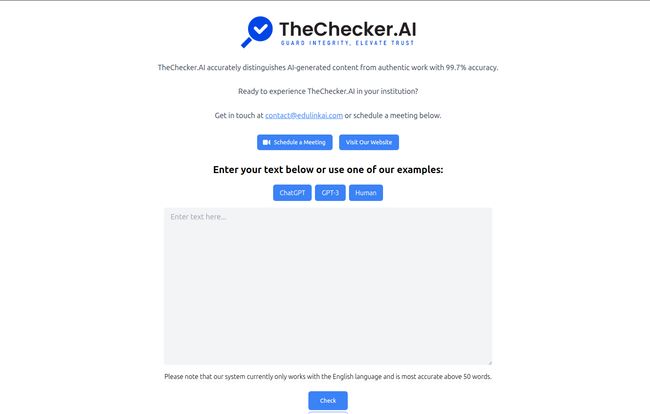
Visit AICheatCheck
They even include helpful example buttons—'ChatGPT', 'GPT-3', and 'Human'—so you can see the tool in action without having to dig up your own samples. It's a small thing, but it shows they've thought about the user experience. You just paste your content, and it spits out a verdict. Simple as that.
That 99.7% Accuracy Claim: Too Good to Be True?
Okay, let's talk about the elephant in the room. 99.7% accuracy. In the world of AI detection, that's like claiming you’ve invented a perpetual motion machine. Most detectors struggle, especially as AI models get more sophisticated. They can be fooled by AI content that's been slightly edited by a human, or worse, they flag human writing as AI-generated (a dreaded false positive).
So, where does this confidence come from? Well, TheChecker.AI has some serious social proof. Their site is plastered with logos from major publications like Forbes, 7NEWS, ABC News, and Times Higher Education. This isn't some fly-by-night tool built in a weekend. Being featured by these outlets suggests that their methodology has, at the very least, been vetted and found credible by journalists and industry experts. It lends a lot of weight to their claims and makes me think there's real substance behind the numbers.
This whole situation reminds me of the early days of plagiarism checkers like Turnitin. At first, people were skeptical. But over time, they became an indispensable part of the academic toolkit. I believe we're seeing the same evolution with AI detection now, and TheChecker.AI is positioning itself as a top-tier, academic-grade solution.
Who Is This AI Detector Really For?
The site makes it crystal clear: this is for educators. It's built to give teachers confidence in their assessments. But as an SEO and content manager, my mind immediately goes elsewhere. Could this be a useful tool for us, too?
Think about it. If you manage a team of freelance writers, you need to ensure the content you're paying for is original. Or, if you're worried about Google’s stance on AI content, you might want to run your own work through a detector just to see how it registers. While its primary market is academia, a highly accurate detector has obvious applications for anyone serious about content quality and originality. It could be a powerful tool for upholding your own brand's integrity, not just a school's.
The Not-So-Fine Print and Limitations
No tool is perfect, and TheChecker.AI is upfront about some of its limitations. I actually respect the transparency here.
For one, it only works with the English language right now. That's a significant drawback for international institutions or even schools in multilingual communities. Secondly, it’s most accurate on texts with more than 50 words. This is perfectly reasonable; the algorithm needs a decent sample size to analyze patterns, so you can't just check a single headline or sentence. Finally, it requires JavaScript to run, which is standard for 99% of the web but worth knowing.
I did also hit an unexpected 404 error page once when clicking around, which is a good little reminder that even the most polished platforms have hiccups. It adds a bit of real-world flavor—technology is never infallible, is it?
So, What's the Price Tag?
This is the million-dollar question, isn't it? And in this case, the answer is... unclear. The website doesn't list any pricing plans. Instead, it prompts you to “Schedule a Meeting.”
This tells me that TheChecker.AI is likely operating on an institutional or enterprise model. You won't find a $10/month plan for individual users. Instead, they are probably selling licenses to entire school districts, universities, or large companies. I’ve always found opaque pricing a bit frustrating, but for a B2B or ed-tech tool targeting large organizations, it’s pretty standard practice. They want to talk to you, understand your needs, and give you a custom quote.
The Bottom Line: Is This Thing Worth It?
After playing around with it and digging into what it offers, I'm genuinely impressed, but with a few caveats. This isn't a silver bullet for every SEO's content woes. However, for its intended audience—the academic community—it seems incredibly potent. The high accuracy claim, backed by significant media attention, makes it a tool that anyone in education simply has to investigate.
For us in the marketing and content world, it's a fascinating and powerful tool to keep on our radar. It represents the top tier of detection technology. While you might not need it for daily checks, it's a great benchmark for understanding what's possible and a potential lifesaver if you're managing content at scale and need to be absolutely sure of its origin.
Frequently Asked Questions
- How accurate is TheChecker.AI?
- The company claims a very high accuracy rate of 99.7% in distinguishing AI-generated content from human-written text.
- Can I use TheChecker.AI for free?
- You can test the tool with your own text on their homepage. However, for ongoing use, it appears to be a paid service for institutions, requiring you to schedule a meeting for a quote rather than offering a free individual plan.
- What languages does this AI checker support?
- Currently, TheChecker.AI only supports the English language.
- Who is the main audience for this tool?
- Its primary audience is educators, including teachers, professors, and academic administrators, to help uphold academic integrity. However, content managers and SEOs may also find it useful for verifying content originality.
- Is TheChecker.AI better than other AI detectors?
- With its high claimed accuracy and strong social proof from major publications, it stands out as a top contender in the AI detection space, particularly for academic use cases where precision is critical.
Final Thoughts
The rise of AI is not something to be feared, but something to be managed. Tools like TheChecker.AI aren't about punishing people but about preserving the value of authentic, human-created work. They are a necessary part of this new ecosystem. Whether it's in a classroom or a corporate blog, knowing the origin of a piece of writing matters. And for educators trying to guard that line, this tool might just be the best defense they have right now.
